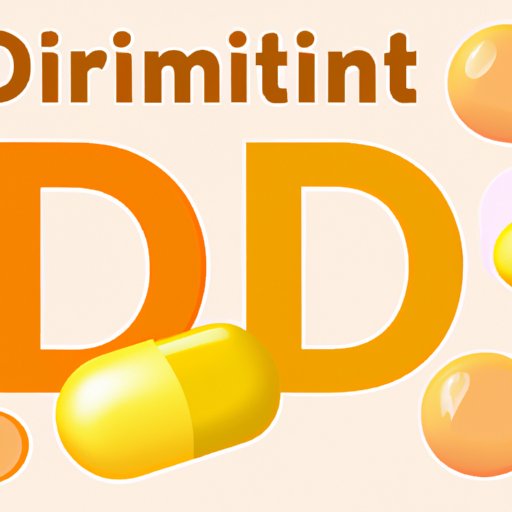
Introduction
Vitamin D is an essential nutrient that helps our bodies absorb calcium and maintain bone health. It also plays a role in supporting our immune system, reducing inflammation, and protecting against certain diseases like cancer, diabetes, and multiple sclerosis. However, like many nutrients, it is possible to have too much of a good thing. In this article, we explore whether taking 5000 IU of Vitamin D is too much and the potential health risks associated with excessive intake.
The Pros and Cons of Taking 5000 IU of Vitamin D
Getting enough Vitamin D is important for overall health and wellbeing. In addition to supporting bone health and immune function, studies have suggested that Vitamin D may also play a role in reducing the risk of heart disease, depression, and certain types of cancer.
However, taking too much Vitamin D can also have negative consequences. When levels of Vitamin D in the blood become too high, it can lead to a condition called Vitamin D toxicity. Symptoms of toxicity can include nausea, vomiting, weakness, kidney damage, and even death in severe cases.
The Latest Research on the Effects of High Doses of Vitamin D
Recent studies have investigated the potential impact of high doses of Vitamin D on various health outcomes. Some studies have found that higher doses of Vitamin D may be associated with a lower risk of certain diseases, while others have found no significant benefit.
For example, a study published in the Journal of the American Medical Association found that high-dose Vitamin D supplementation did not reduce the risk of falls or fractures in older adults compared to a placebo. Another study published in the Journal of Clinical Endocrinology and Metabolism found that high-dose Vitamin D supplementation did not improve bone density in postmenopausal women.
On the other hand, some studies have shown that high-dose Vitamin D supplementation may have benefits for certain populations. For example, a study published in the American Journal of Clinical Nutrition found that high-dose Vitamin D supplementation was associated with a lower risk of respiratory infections in children.
How to Determine the Right Amount of Vitamin D for You
The amount of Vitamin D that is right for you depends on individual factors such as age, skin color, and overall health status. The National Institutes of Health recommends that adults get between 600-800 IU of Vitamin D per day, although some individuals may require more.
To determine your own Vitamin D needs, it’s important to consider your lifestyle and dietary habits. For example, if you spend a lot of time outdoors in the sun, you may require less Vitamin D. Conversely, if you are vegan or don’t consume dairy products, you may need to supplement with Vitamin D to ensure adequate intake.
Common Symptoms of Vitamin D Toxicity
If you are taking high doses of Vitamin D, it’s important to be aware of the symptoms of Vitamin D toxicity. These can include:
- Nausea and vomiting
- Weakness and fatigue
- Kidney damage
- Constipation
- Confusion or disorientation
- Dehydration
If you experience any of these symptoms, it’s important to seek medical attention right away.
The Dangers of Megadoses
While some studies have suggested that higher doses of Vitamin D may be beneficial for certain populations, it’s important to be cautious about taking megadoses of this nutrient. In some cases, taking too much Vitamin D can actually be harmful.
For example, a recent case report highlighted the dangers of megadosing on Vitamin D. A man in the UK was taking 20,000 IU of Vitamin D per day, which resulted in kidney damage and other severe symptoms. While this is an extreme example, it underscores the importance of being mindful when it comes to taking supplements.
Natural Sources of Vitamin D
While supplements can be a useful way to boost your Vitamin D intake, it’s always best to aim to get your nutrients from whole foods whenever possible. Some natural sources of Vitamin D include:
- Fatty fish like salmon, mackerel, and tuna
- Egg yolks
- Fortified dairy products like milk, yogurt, and cheese
- Mushrooms (when exposed to sunlight)
By including these foods in your diet, you can help ensure that you are getting enough Vitamin D for optimal health.
The Importance of Consulting with a Doctor
If you are considering taking a Vitamin D supplement, it’s important to consult with your healthcare provider first. They can help you determine the right dose for your individual needs and monitor your Vitamin D levels over time.
When speaking with your doctor, it can be helpful to bring a list of any other supplements or medications you are taking, as well as information about your lifestyle and dietary habits. This can help your doctor make a more informed recommendation that takes all of your unique circumstances into account.
Conclusion
Vitamin D is an important nutrient that plays a vital role in many aspects of our health. While it’s important to get enough of this nutrient, it’s equally important to be mindful of the potential risks associated with excessive intake.
By understanding your own individual needs and consulting with a healthcare provider, you can help ensure that you are getting the right amount of Vitamin D for your unique circumstances. And by focusing on natural sources of this nutrient, you can support your overall health and wellbeing for years to come.





